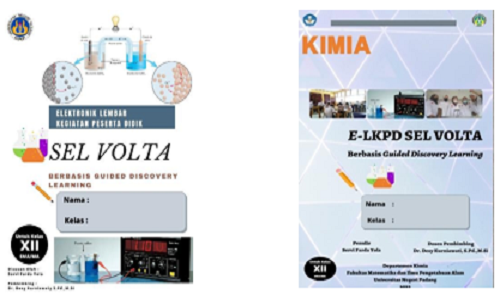
Development of Guided Discovery Learning Voltaic Cell E-LKPD for Class XII SMA/MA Students
Abstract
Keywords
Full Text:
PDFReferences
Febyanti, & Anatasya, D. (2020). Kesulitan Siswa Kelas XII MIA SMA Negeri Di Kota Palangka Raya Tahun Ajaran 2018/2019 Dalam Memahami Konsep Sel Elektrolisis Yang Ditelusuri Menggunakan Instrumen Two Tier Multiple Choiche. Jurnal Ilmiah Kanderang Tingang. 11(1).
Hake. (1999). Analyzing Change/Gain Scores. Dept. of Phisics, Indiana University. USA.
Hastuti. (2018). Penerapan Model Pembelajaran Guided Discovery Learning (GDL) untuk Meningkatkan Hasil Belajar Siswa Kelas XI-ATPH SMKN 1 Woja. Jurnal Ilmiah Ilmu Pendidikan. 1(2).
Lestari, L, dkk. (2018). Validitas dan Praktikalitas Lembar Kerja Peserta Didik (LKPD) Materi Kingdom Plantae Berbasis Pendekatan Saintifik untuk Peserta Didik Kelas X SMA/MA. Jurnal Eksakta Pendidikan (JEP). 2(2).
Musfiqon. (2015). Pendekatan Pembelajaran Saintifik. Sidoarjo: Nizamia Learning Center.
Nandya R. J. & Hafsah. (2016). Penerapan Media Pembelajaran Modul Elektronik Untuk Meningkatkan Hasil Belajar Siswa Pada Mata Pelajaran Teknologi Mekanik. Journal of Mechanical Engineering Education. 3(1).
Nanang, S. (2015). Mengembangkan Kemampuan Koneksi Matematis Melalui Buku Ajar Elektronik Interaktif (BAEI) yang Terintegrasi Nilai-Nilai Keislaman. Jurnal Pendidikan Matematika. 6(1).
Permendikbud No. 35. (2018). Tentang Perubahan Atas Permendikbud No. 58 Tahun 2014 Tentang Kurikulum 2013 Sekolah Menengah Pertama/Madrasah Tsanawiyah.
Plomp T, dkk. (2013). Educational design research, Part A: An Introduction Netherlands, Enschede.
Prastowo, A. (2015). Panduan Kreatif Membuat Bahan Ajar Inovatif: Menciptakan Metode Pembelajaran yang Menarik dan Menyenangkan. Yogyakarta: DIVA Press.
Retnawati, H. (2016). Analisis Kuantitatif Instrumen Penelitian. Yogyakarta: Parama Publishing.
Simamora, Rustam E., dkk. (2021). Penerapan Model Guided Discovery Learning (GDL) dengan Pendekatan Saintifik Berbantuan Geogebra pada Topik Geometri. 1(11).
Sugiyono. (2013). Metode penelitian kuantitatif, kualitatif, dan R&D. Bandung: Alfabeta.
Yerimadesi. (2017). Buku Model: Guided Discovery Learning untuk Pembelajaran Kimia (GDL-PK) SMA. Padang: UNP.
Yerimadesi. (2018). Pengembangan Model Guided Discovery Learning (GDL) untuk Meningkatkan Keterampilan Berpikir Kritis Siswa Pada Pembelajaran Kimia di SMA. Disertasi.
Yuliasari, E. (2017). Eksperimentasi Model PBL dan Model GDL Terhadap Kemampuan Pemecahan Masalah Matematis Ditinjau dari Kemandirian Belajar. Jurnal Ilmiah Pendidikan Matematika. 6(1).
DOI: http://dx.doi.org/10.31258/jes.7.1.p.110-121
Refbacks
- There are currently no refbacks.
Copyright (c) 2023 Servi Farda Yola

This work is licensed under a Creative Commons Attribution 4.0 International License.
Publisher: FKIP Universitas Riau












